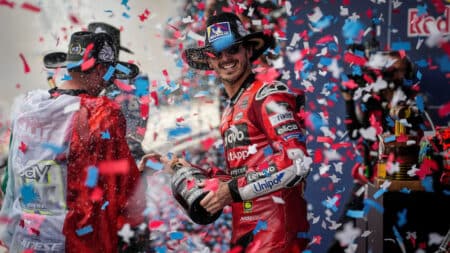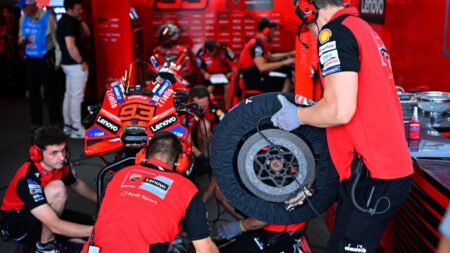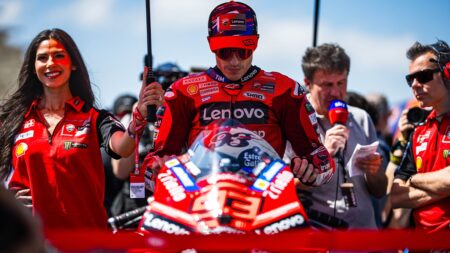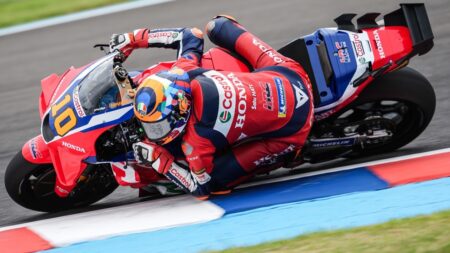That Qatar race was pretty special and not only because it was hugely entertaining, but because one of the riders battling for victory was almost old enough to be the other’s dad.

Valentino Rossi turned 35 in February, just a few days before Marc Márquez hit 21. That’s an age difference of 14 years, which isn’t something that happens very often in professional sport; in fact, has it ever happened before in motorcycle Grand Prix racing?
Past battles
The question prompted me to trawl through my history books for evidence of a similar generation gap at the sharp end of premier-class GPs.
Leslie Graham is the oldest rider to be crowned 500 king. He won the inaugural 500 World Championship in 1949, just a few days short of his 38th birthday, but he mostly raced against similar-aged racers who like him had had their early racing careers rudely interrupted by the Second World War. Graham had been an RAF bomber pilot, flying Lancasters over Germany.
Of course, it happened on the other side too. Fritz Hillebrand was a Luftwaffe fighter pilot who got shot down and ended the war in a POW camp. In 1957 he won the sidecar world title, but lost his life in a race at Bilbao before the end of the season. Graham had been killed at the TT a few years earlier.

Sorry, I’m getting sidetracked. Fast forward to September 1962 and Mike Hailwood is cruising to his first 500 World Championship on the mighty MV Agusta at Monza. He’s just 22 years old and MV have given him a bit of home-race competition in the form of veteran Remo Venturi who is already 35. Hailwood beats the old man by five seconds.
A dozen years later the four-stroke MV is on its way to another world title, this time with 35-year-old Phil Read on board. At the season-opening French GP at Clermont-Ferrand, Read gets a bit of a scare from an uppity 23-year-old Cockney called Barry Sheene, who’s riding one of those new-fangled Suzuki RG500 two-strokes. This time the old man wins the day.
But the greatest old dog versus new kid on the block duel happened at Donington in July 2000, when 36-year-old Jeremy McWilliams fought for victory in the British GP with 21-year-old Rossi. There might’ve been 15 years between the Briton and the Italian but you would never have known it, just like in Qatar on Sunday.
McWilliams was the grand old man of Grand Prix racing by then, racing Aprilia’s underpowered Aprilia v-twin against Rossi’s all-powerful NSR500. He knew that tight and twisty Donington – also damp and slippery on this occasion – would be by far his best chance of scoring a 500 GP win.

The pair swapped the lead time and again, with mere millimetres to spare between them, just like Rossi would do 14 years later with Márquez. Eventually McWilliams overheated his softer intermediate tyres and crossed the line third, just 0.9 seconds behind first-time 500 winner Rossi, with Suzuki’s Kenny Roberts Jr between them.
Unsurprisingly, McWilliams remembers the battle well. “The inspiration for me was the younger and feistier they were, the better. I know from that race with Rossi that he would’ve got such a buzz from battling for the win with Márquez on Sunday. It certainly spurs you up when you’re fighting against the young guns.
“I remember slipping underneath him at the Old Hairpin a couple of times, deliberately trying to lift him a bit and put him off his game. I thought you could do that and get away with it because maybe the young guns would give a little to older guys like me, but I don’t think Márquez does that!
“Rossi made some pretty hard moves on Márquez on Sunday, though they were all very clean, positive and precise, which made it such a good race. That definitely showed that he’s still got the fight in him, he doesn’t give an inch. It was great to see the old dog giving Márquez a run for his money, and I hope it continues.”
Rossi and Márquez ended the Qatar race just like Rossi and McWilliams ended their Donington duel: shaking hands, laughing and joking about all the crazy things they’d done to each other – a pair of grinning assassins.

“Rossi was always the easiest person to get on with after a race, even if you’d beaten him,” adds McWilliams. “A lot of riders aren’t like that; he was always very complimentary.”
But it was Roberts Jr who was most interesting after that Donington race. “I’ll finish second to Rossi for the rest of the year, if the racing’s going to be like that,” he said at the time. “Those guys really over-ride their bikes, instead of just riding them round and round like the rest of them.”
You just know that Rossi and Márquez think the same about some of their rivals. They are both gladiators, in it for the fight, not just for riding round and round. Hopefully Rossi’s Qatar renaissance won’t be another false dawn, so that the old dog and the young gun can continue to show us how to race.
More from Mat Oxley
Moving MotoGP’s goal posts
Why the door was left Open for Ducati
The death of bike racing in the US?









